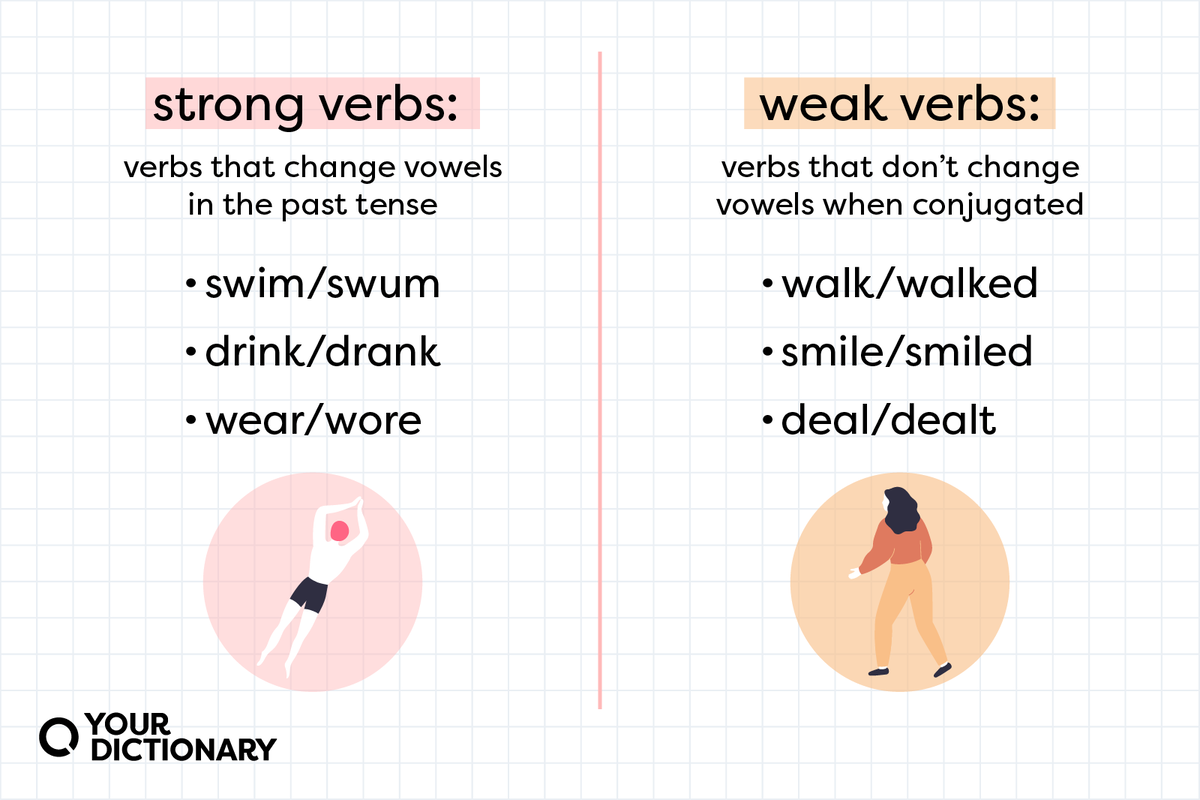
Why is walked the past tense form of walk, but swam is the past tense of swum? It’s not to confuse you (although it may feel that way). Walk is a grammatically weak verb, while swim is a grammatically strong verb, so you conjugate them differently. It all goes back to the Germanic roots of English and the Brothers Grimm (yes, the fairy tale guys).
What Are Strong and Weak Verbs?
In English, the labels strong and weak refer to how a verb changes in past tense or as a past participle — specifically, how their stem vowels change.
| Strong Verbs | Weak Verbs | |
|---|---|---|
| Definition | verbs that change vowel in the past tense | verbs that don’t change vowels when conjugated |
| Examples | swim/swum, drink/drank, wear/wore | walk/walked, smile/smiled, deal/dealt |
Additionally, strong verbs don’t add -d, -ed, or -t in the past tense, while weak verbs do add these endings.
The terms "strong" and "weak" come from the German terms starkes Verb ("strong verbs") and schwaches Verb ("weak verb"), coined by Jakob Grimm of the Brothers Grimm.
Examples of Strong Verbs
Verbs that change vowel sounds when changing verb tense are considered strong verbs in English. Past participle forms of strong verbs often end in -n or -en, similar to their Germanic origins.
There are only around 200 strong verbs in English, but chances are, you use them all the time. Common strong verbs include:
|
Strong Verb |
Past Tense |
Past Participle |
|
bear |
bore |
born |
|
begin |
began |
begun |
|
bite |
bit |
bitten |
|
bear |
bore |
born |
|
blow |
blew |
blown |
|
choose |
chose |
chosen |
|
drink |
drank |
drunk |
|
drive |
drove |
driven |
|
fight |
fought |
fought |
|
forget |
forgot |
forgotten |
|
give |
gave |
given |
|
grow |
grew |
grown |
|
ring |
rang |
rung |
|
shake |
shook |
shaken |
|
sing |
sang |
sung |
|
stick |
stuck |
stuck |
|
swim |
swam |
swum |
|
swing |
swung |
swung |
|
ring |
rang |
rung |
|
wear |
wore |
worn |
Strong Verbs vs. Irregular Verbs: There's a Difference
Like strong verbs, irregular verbs don’t have a regular conjugation pattern. They don’t add -ed or -t to their endings like regular verbs. That’s why most strong verbs are also irregular verbs — but not all irregular verbs are strong verbs, since some irregular verbs do end in -t or -ed (such as bent or slept).
Examples of Weak Verbs
Weak verbs add -t, -d, or-ed to their endings when conjugated to past tense or past participle. Also, if a verb merely shortens its stem vowel (such as bleed and bled) or remains the same in the present and past tense (such as hit and hit), it's a weak verb.
Most of these verbs are also known as regular verbs — verbs that don’t change their spelling in the past tense or past participle (besides adding these endings). Examples of common weak verbs include:
|
Weak Verb |
Past Tense |
Past Participle |
|
add |
added |
added |
|
admire |
admired |
admired |
|
call |
called |
called |
|
deal |
dealt |
dealt |
|
dream |
dreamed |
dreamed |
|
earn |
earn |
earn |
|
enjoy |
enjoyed |
enjoyed |
|
fade |
faded |
faded |
|
hit |
hit |
hit |
|
measure |
measured |
measured |
|
shoot |
shot |
shot |
|
sleep |
slept |
slept |
|
taste |
tasted |
tasted |
|
yell |
yelled |
yelled |
Examples of Irregular Weak Verbs
Some verbs, such as catch/caught and buy/bought, change both their vowel sound and their endings when conjugating to the past tense. These verbs are irregular weak verbs, since verbs that add -d or -t in the past tense are always considered weak verbs.
Examples of irregular weak verbs include:
- buy - bought
- bring - brought
- cut - cut
- flee - fled
- leave - left
- sell - sold
- teach - taught
- weep - wept
Are Strong Verbs Stronger Than Weak Verbs?
These terms have nothing to do with the verb's strength in writing; they only reference that verb's inflection in German (and English) conjugation that we mentioned above.
However, when a teacher encourages students to use “strong verbs,” they probably want them to use evocative and precise verbs, such as dashed instead of ran or shouted instead of said. They’re probably not asking you to use grammatically strong verbs, since there is no word choice preference between the types of strong or weak verbs described in this article.
If you’d like to avoid “weak” or overused words in your writing, try using action verbs or avoiding passive voice. But those definitions of "strong" have nothing to do with the proper grammatical definition.